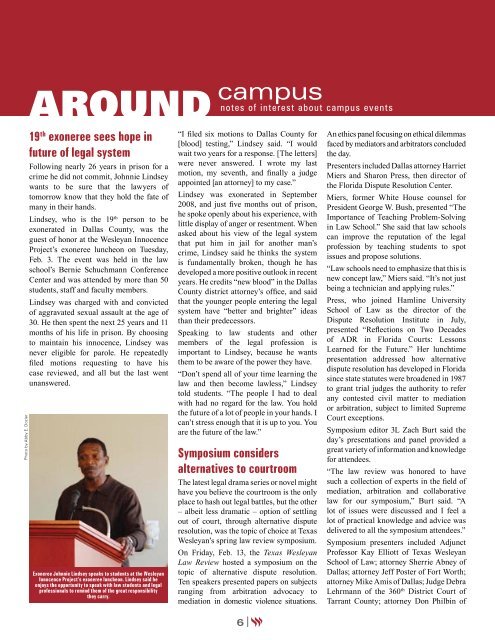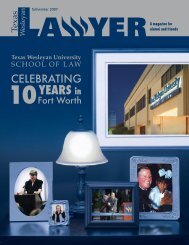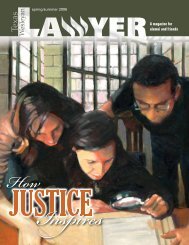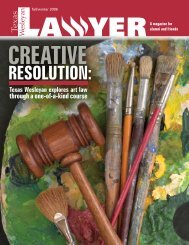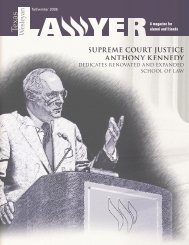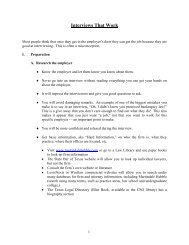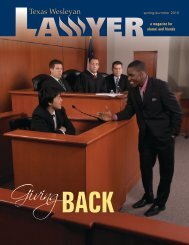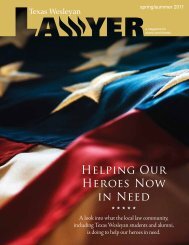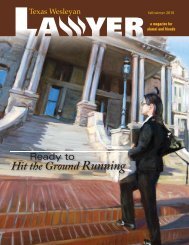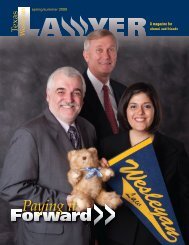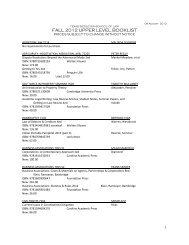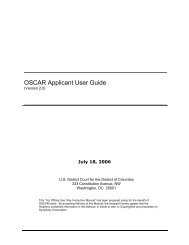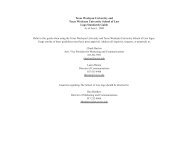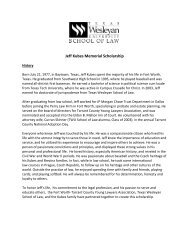Reflections - Texas Wesleyan School of Law - Texas Wesleyan ...
Reflections - Texas Wesleyan School of Law - Texas Wesleyan ...
Reflections - Texas Wesleyan School of Law - Texas Wesleyan ...
Create successful ePaper yourself
Turn your PDF publications into a flip-book with our unique Google optimized e-Paper software.
Photo by Abby E. Dozier<br />
around<br />
19th exoneree sees hope in<br />
future <strong>of</strong> legal system<br />
Following nearly 26 years in prison for a<br />
crime he did not commit, Johnnie Lindsey<br />
wants to be sure that the lawyers <strong>of</strong><br />
tomorrow know that they hold the fate <strong>of</strong><br />
many in their hands.<br />
Lindsey, who is the 19th person to be<br />
exonerated in Dallas County, was the<br />
guest <strong>of</strong> honor at the <strong>Wesleyan</strong> Innocence<br />
Project’s exoneree luncheon on Tuesday,<br />
Feb. 3. The event was held in the law<br />
school’s Bernie Schuchmann Conference<br />
Center and was attended by more than 50<br />
students, staff and faculty members.<br />
Lindsey was charged with and convicted<br />
<strong>of</strong> aggravated sexual assault at the age <strong>of</strong><br />
30. He then spent the next 25 years and 11<br />
months <strong>of</strong> his life in prison. By choosing<br />
to maintain his innocence, Lindsey was<br />
never eligible for parole. He repeatedly<br />
filed motions requesting to have his<br />
case reviewed, and all but the last went<br />
unanswered.<br />
Exoneree Johnnie Lindsey speaks to students at the <strong>Wesleyan</strong><br />
Innocence Project’s exoneree luncheon. Lindsey said he<br />
enjoys the opportunity to speak with law students and legal<br />
pr<strong>of</strong>essionals to remind them <strong>of</strong> the great responsibility<br />
they carry.<br />
campus<br />
notes <strong>of</strong> interest about campus events<br />
“I filed six motions to Dallas County for<br />
[blood] testing,” Lindsey said. “I would<br />
wait two years for a response. [The letters]<br />
were never answered. I wrote my last<br />
motion, my seventh, and finally a judge<br />
appointed [an attorney] to my case.”<br />
Lindsey was exonerated in September<br />
2008, and just five months out <strong>of</strong> prison,<br />
he spoke openly about his experience, with<br />
little display <strong>of</strong> anger or resentment. When<br />
asked about his view <strong>of</strong> the legal system<br />
that put him in jail for another man’s<br />
crime, Lindsey said he thinks the system<br />
is fundamentally broken, though he has<br />
developed a more positive outlook in recent<br />
years. He credits “new blood” in the Dallas<br />
County district attorney’s <strong>of</strong>fice, and said<br />
that the younger people entering the legal<br />
system have “better and brighter” ideas<br />
than their predecessors.<br />
Speaking to law students and other<br />
members <strong>of</strong> the legal pr<strong>of</strong>ession is<br />
important to Lindsey, because he wants<br />
them to be aware <strong>of</strong> the power they have.<br />
“Don’t spend all <strong>of</strong> your time learning the<br />
law and then become lawless,” Lindsey<br />
told students. “The people I had to deal<br />
with had no regard for the law. You hold<br />
the future <strong>of</strong> a lot <strong>of</strong> people in your hands. I<br />
can’t stress enough that it is up to you. You<br />
are the future <strong>of</strong> the law.”<br />
Symposium considers<br />
alternatives to courtroom<br />
The latest legal drama series or novel might<br />
have you believe the courtroom is the only<br />
place to hash out legal battles, but the other<br />
– albeit less dramatic – option <strong>of</strong> settling<br />
out <strong>of</strong> court, through alternative dispute<br />
resolution, was the topic <strong>of</strong> choice at <strong>Texas</strong><br />
<strong>Wesleyan</strong>’s spring law review symposium.<br />
On Friday, Feb. 13, the <strong>Texas</strong> <strong>Wesleyan</strong><br />
<strong>Law</strong> Review hosted a symposium on the<br />
topic <strong>of</strong> alternative dispute resolution.<br />
Ten speakers presented papers on subjects<br />
ranging from arbitration advocacy to<br />
mediation in domestic violence situations.<br />
6<br />
An ethics panel focusing on ethical dilemmas<br />
faced by mediators and arbitrators concluded<br />
the day.<br />
Presenters included Dallas attorney Harriet<br />
Miers and Sharon Press, then director <strong>of</strong><br />
the Florida Dispute Resolution Center.<br />
Miers, former White House counsel for<br />
President George W. Bush, presented “The<br />
Importance <strong>of</strong> Teaching Problem-Solving<br />
in <strong>Law</strong> <strong>School</strong>.” She said that law schools<br />
can improve the reputation <strong>of</strong> the legal<br />
pr<strong>of</strong>ession by teaching students to spot<br />
issues and propose solutions.<br />
“<strong>Law</strong> schools need to emphasize that this is<br />
new concept law,” Miers said. “It’s not just<br />
being a technician and applying rules.”<br />
Press, who joined Hamline University<br />
<strong>School</strong> <strong>of</strong> <strong>Law</strong> as the director <strong>of</strong> the<br />
Dispute Resolution Institute in July,<br />
presented “<strong>Reflections</strong> on Two Decades<br />
<strong>of</strong> ADR in Florida Courts: Lessons<br />
Learned for the Future.” Her lunchtime<br />
presentation addressed how alternative<br />
dispute resolution has developed in Florida<br />
since state statutes were broadened in 1987<br />
to grant trial judges the authority to refer<br />
any contested civil matter to mediation<br />
or arbitration, subject to limited Supreme<br />
Court exceptions.<br />
Symposium editor 3L Zach Burt said the<br />
day’s presentations and panel provided a<br />
great variety <strong>of</strong> information and knowledge<br />
for attendees.<br />
“The law review was honored to have<br />
such a collection <strong>of</strong> experts in the field <strong>of</strong><br />
mediation, arbitration and collaborative<br />
law for our symposium,” Burt said. “A<br />
lot <strong>of</strong> issues were discussed and I feel a<br />
lot <strong>of</strong> practical knowledge and advice was<br />
delivered to all the symposium attendees.”<br />
Symposium presenters included Adjunct<br />
Pr<strong>of</strong>essor Kay Elliott <strong>of</strong> <strong>Texas</strong> <strong>Wesleyan</strong><br />
<strong>School</strong> <strong>of</strong> <strong>Law</strong>; attorney Sherrie Abney <strong>of</strong><br />
Dallas; attorney Jeff Poster <strong>of</strong> Fort Worth;<br />
attorney Mike Amis <strong>of</strong> Dallas; Judge Debra<br />
Lehrmann <strong>of</strong> the 360th District Court <strong>of</strong><br />
Tarrant County; attorney Don Philbin <strong>of</strong>


